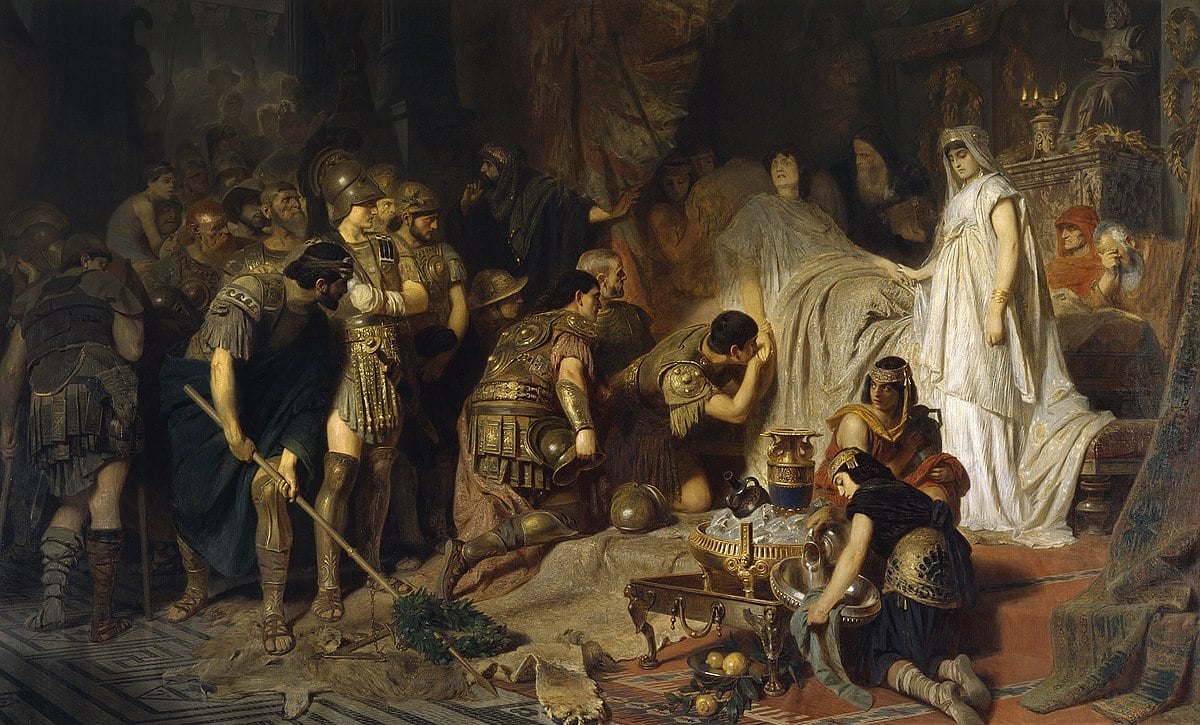The Hellenistic period was a veritable cauldron of ambition, betrayal, and sheer bloodlust. It was an era marked by dramatic power struggles and ruthless political maneuvers. Political assassinations that shook ancient Greece were both shocking and strategic, shaping the course of history. Here are some of the most famous ones.
Philip II of Macedon met his end at a wedding in Aegae, celebrating the nuptials of his dear daughter, Cleopatra. Enter Pausanias, a member of Philip’s very own bodyguard, who, driven by grievances both personal and (some say) politically motivated, struck down the king.
Conspiracies abound that Olympias, the formidable queen, or even young Alexander himself, might have pulled the strings. The shock of this assassination lay in its brazenness and the potential involvement of the king’s closest family members.
The idea that Philip’s own wife and son might have had a hand in his murder only added to the sense of treachery and intrigue in ancient Greece. This was one of the many political assassinations that shook ancient Greece.
Parmenion, stalwart general and father figure to Alexander, found himself ensnared in a web of suspicion and intrigue. His son, Philotas, was accused of plotting against Alexander, and, despite years of loyal service, Parmenion was deemed a threat and summarily executed.
The loyalty he had shown Alexander counted for nothing. The shock of Parmenion’s assassination was rooted in the ruthless efficiency with which Alexander dealt with perceived threats, eliminating not just the accused but also anyone remotely connected to them.
Parmenion’s fate highlighted the precariousness of even the most loyal and long-serving of Alexander’s followers in ancient Greece. Another example of political assassinations that stunned ancient Greece.
Cleopatra of Macedon, sister to the great Alexander, was a pawn in the deadly chess game of Hellenistic politics. Her alliances through marriage made her a significant figure, and thus, a threat to Antigonus I.
Her untimely end by his agents is a grim reminder of how marriage and politics intertwine lethally. The assassination of Cleopatra was shocking because it demonstrated the lengths to which power-hungry leaders would go to eliminate rivals.
Cleopatra’s murder underscored the brutal reality that familial connections offered no protection in the cutthroat world of ancient Greece, shocking the region.
Poor Philip III Arrhidaeus, the half-brother of Alexander, was more of a puppet than a king. His execution at the hands of Olympias, eager to clear the path for her grandson, Alexander IV, is a tale as old as time: eliminate the rival to secure the throne.
The shock here was in the sheer cold-bloodedness of Olympias, who showed no hesitation in killing her own stepson to ensure her lineage’s hold on power. Philip III’s murder highlighted the ruthless nature of familial power struggles in ancient Greece.
The young Alexander IV, the offspring of Alexander the Great and Roxana, met a grim fate along with his mother under the orders of the ambitious Cassander. By removing the legitimate heirs, Cassander ensured his grip on power.
The assassination of Alexander IV was particularly shocking because it marked the end of the direct line of Alexander the Great.
Cassander’s actions epitomized the brutal realpolitik of the time, showing that even children were not safe from the machinations of ambitious men in ancient Greece. Another example of political assassinations that mortified ancient Greece.
Perdiccas, a regent whose ambition knew no bounds, was ultimately undone by his own officers during a campaign in Egypt. His high-handed policies proved too much for his subordinates, leading to his dramatic fall.
The shock of Perdiccas’ assassination lay in the mutiny of his trusted officers, highlighting the fragile nature of loyalty in an era where personal ambition often trumped allegiance to a leader.
Perdiccas’ fall illustrated the ever-present danger of internal betrayal among the highest echelons of power in ancient Greece. This was one of the significant political assassinations that abhored ancient Greece.
This incident highlighted the unpredictable and dangerous nature of Alexander’s personality in ancient Greece. Another among the political assassinations that horrified ancient Greece.
Alexander the Great
The mighty Alexander the Great, a titan whose empire spanned from Greece to the edges of India, met a mysterious and untimely end in the opulent palace of Nebuchadnezzar II in Babylon.
At the tender age of 32, this young demigod of war succumbed to what some claim was a fever, others poison, and yet more conjecture, a lethal cocktail of exhaustion and the excesses of a life lived at the edge of a sword’s point.
The death of Alexander was shocking due to the mystery surrounding it and the massive power vacuum it created. His demise unleashed a wave of conflict and chaos as his generals scrambled to carve up his vast empire, leading to decades of warfare and instability in ancient Greece. This was indeed one of the political assassinations that stunned ancient Greece.
These brutal tales from the Hellenistic period reveal a world immersed in personal vendettas, political intrigue, and relentless power struggles. The real-life conflicts over Alexander’s empire were a deadly dance of ambition, treachery, and betrayal.
These stories underscore that political assassinations that shook ancient Greece have long been a tool for political advancement, shedding light on a dark facet of human history. They document the enduring use of organized murder as a cruel yet decisive method for removing political figures from power.
Thanos Matanis
ΟΔΥΣΣΕΙΑ, 6/8/2024 #ODUSSEIA #ODYSSEIA, Greek Reporter

